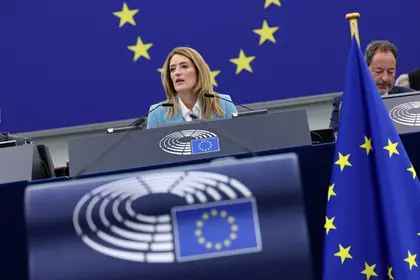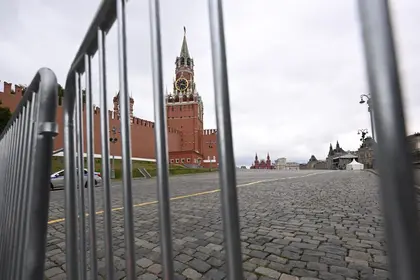Now that Ukraine’s enacted major reforms to fight corruption to be eligible for European Union talks, it’s time for the EU to make big changes to welcome it, European Parliament President Roberta Metsola has said.
“If they are going fast, we should match that speed,” Metsola told The Guardian in an interview published Tuesday.
JOIN US ON TELEGRAM
Follow our coverage of the war on the @Kyivpost_official.
In October, Ukraine is likely to have made enough progress on the seven areas of reforms that the EU laid out in order for formal membership talks to begin in December.
“I expect a concrete outcome because the worst signal could be that we have given these people targets and deadlines which we can’t meet ourselves,” Metsola said.
Despite facing Russia’s ongoing attacks, Kyiv still prioritizes eventual EU membership and in fact honored an amendment in its constitution by applying for it – just four days after Russia’s full-scale invasion on Feb. 24, 2022.
Indeed, it was former Ukrainian President Viktor Yanukovych’s decision not to honor a campaign promise to join a political association and free trade agreement with the EU (a precursor to EU membership) back in 2013 that triggered the Maidan protests, which would lead to the Revolution of Dignity – and the beginning of Russia’s initial invasion of Ukraine in 2014.
Now, from the EU’s perspective, Metsola said that there’s “nothing off the table” including removing trade tariffs and giving Kyiv more access to the European market.

Zelensky Announces More Money to House Those Displaced by War
Metsola – who was the first political leader to visit Ukraine after Russia’s full-scale invasion – told The Guardian that “Pushing the can down the road” would fuel nationalism and the far right.
“It increases the extremes on the political spectrum, the Euroscepticism. Campaigns in accession countries are fought, and lost or won, on the basis of the dream and hope of the EU,” she told The Guardian.
Even before full EU membership, there are ways the EU can start integrating Ukraine more, right now, Metsola said – who highlighted opening access to universities and removing mobile phone roaming costs.
“We said for years Ukraine could not be connected to the European electricity grid. It took us days to do that once the war started. At the end of the day it was always about political will,” she said.
Since June, adding to earlier reforms to its judiciary and its media environment, Ukraine made several key reforms against corruption, against its oligarchs and for minority rights.
Despite support from Metsola and European Commission President Ursula von der Leyden, some of Europe’s leaders may attempt to create hurdles for Ukraine’s accession.
Illustrating the complications of open trade and the power of economics and national politics, Polish Prime Minister Mateusz announced on Sept. 20 that his country, which has been a staunch supporter of Ukraine, would make no new weapons shipments to Ukraine – a move seen as being the result of a row over Ukrainian grain exports, which Poland sees as bad for its farmers.
And on Monday, Hungarian Prime Minister Viktor Orban – who maintains warm ties with Russian President Vladimir Putin – threatened to withdraw all support for Ukraine over so-called concern about its treatment of ethnic Hungarians.
Orban, who last November sported a scarf with a map of “Greater Hungary” that included parts of modern-day Ukraine, was referencing a 2017 language law requiring that in secondary school, Ukrainians, including ethnic Hungarians, be taught general subjects in the Ukrainian language.
Due to Budapest’s protests, in 2019, Kyiv passed an education law stating that Ukraine’s secondary schools would be permitted to continue being taught in Hungarian after all.
Then, on Sept. 21, Kyiv adopted further legislation to satisfy further EU requirements around minority language rights.
However, some officials in Kyiv and Brussels fear Orban – whose government is often in danger of losing EU funding due to a perceived erosion of democratic norms – fear that Budapes will throw up roadblocks for Ukraine to win EU concessions.
“It’s basically blackmail,” Mij Rahman, Europe director of the political risk consultancy group, Eurasia Group told the political publication GZERO. “That’s Orban’s whole schtick in the EU now.”
You can also highlight the text and press Ctrl + Enter






